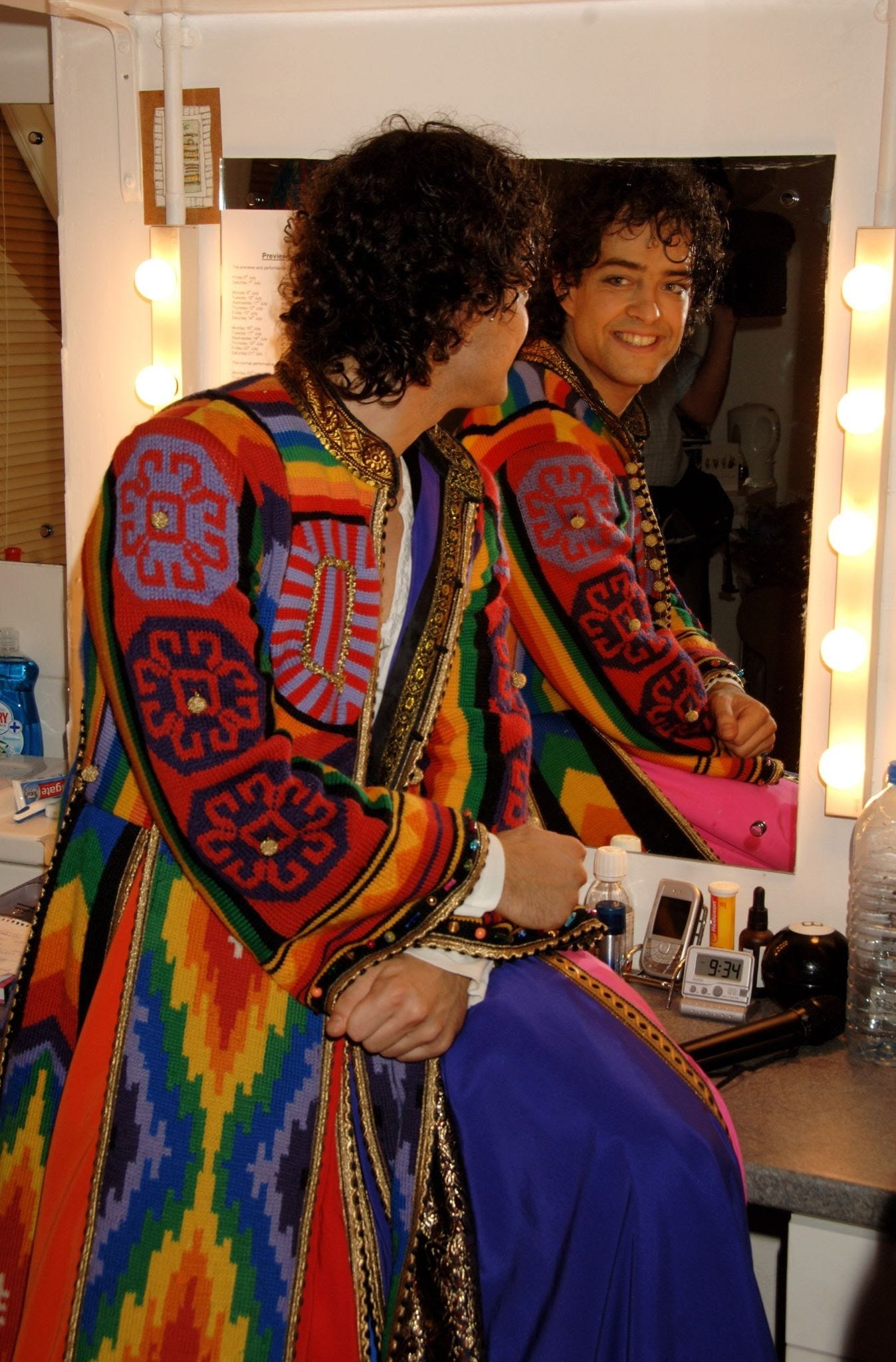(Gender)queering Joseph
Midrashic Possibilities for the Torah's Most Extra Child

This is Life as a Sacred Text 🌱, an everybody-celebrating, justice-centered voyage into ancient stories that can illuminate our own lives. It‘s run on a nonprofit, so it’s 100% NAZI FREE. More about the project here, and to subscribe, go here:
Painful family legacies, when they heal, do not heal quickly.
Abraham, after his own childhood trauma, did not find it in him to fight for either of his sons. Isaac’s silence did not harm his children to the same extent that Abraham’s did, but his passivity enabled one to trick another, for preference to be taken, unjustly.
And Jacob, who helped himself to that unfair preferential treatment for himself, gives it, freely, to one of his children—at the expense of the others’.
Why he does so makes sense—perhaps, unconsciously, as we’ll see in a moment.
Interestingly, the child that is chosen—picked out, beloved, held up, is the one that is, in both Biblical and later Jewish readings, the kid with the most interesting things going on in terms of gender, gender presentation and sexuality. (Of course, these are all different things, but they’re somewhat conflated in the texts that we’ll see today.) Let’s explore, shall we?
It begins even before Joseph is born; first, the Rabbis of the Talmud notice a strange phrasing in Genesis 30:21 and extrapolate that Dina’s sex must have changed in utero, and come up with the following midrash:
“Rav Joseph challenged [the previous statement, never mind what they were talking about, by raising this case]: “And afterwards she bore a daughter and called her name Dinah” (Gen. 30:21). What is meant by ‘afterwards’? Rav said: After Leah had passed judgment [dana din—a wordplay on Dina’s name] on herself, saying, ‘Twelve tribes are destined to issue from Jacob. Six have issued from me [already] and four from the enslaved-women [Bilhah and Zilpah], making ten. If this child will be a male, my sister Rachel will not be equal to one of the enslaved-women [in bearing sons]. Immediately the child was turned to a girl, as it says, ‘And she called her name Dinah!’” (Talmud Brachot 60a)
Another midrashic source, the Targum Pseudo-Jonathan, (Genesis 30:21) extends this midrash to suggest that Rachel was actually already pregnant at the same time, and, at this moment of Leah’s prayer, Joseph and Dina were switched in their mothers’ uteri:
Before God, Leah’s prayer was heard, and the fetuses were switched in their wombs; Joseph was placed in Rachel’s womb and Dinah in the womb of Leah.
This midrash then gets cited in Jewish legal responsa, like the late 19th/early 20 c. Responsa Tzur Yaakov from Rabbi Avraham Yaakov HaLevi Horowitz of Probizhna, Ukraine, which explains (ch. 28):
Certainly, this means that Joseph’s body in Leah’s womb was transformed into a female, while Dinah’s body in Rachel’s womb was transformed into a male, and their souls were transferred from each womb to the other.
So according to this reading, both Dina and Joseph transitioned gender even before they were born! (For the Rabbis, this helped to explain why Dina might engage in such non-gender appropriate activities like “leaving the house,” as discussed last week).
And as for Joseph? Well, it’s implied that there’s a connection between this reading and some of what’s discussed below. But again, gender and gender presentation and sexuality are all different things—though intertwined, for some people. I will try to tease them out, the best that I can.
This, then, is the line of Jacob: At seventeen years of age, Joseph tended the flocks with his brothers, and was like a youth to his father’s wives Bilhah and Zilpah…. Now Israel loved Joseph best of all his sons, for he was the child of his old age; and he had made him a striped tunic. (Genesis 37:2-3)
First of all, midrash is surprised that Joseph is described as being like a youth, despite already being all of seventeen years old already. (Remember, adulthood happened in the ancient world at puberty, so seventeen really was late for them.) So what gives?
The Rabbis of midrash—Genesis Rabbah (which likely dates no later than the early fifth century CE, in what’s now the land of Israel, which was then occupied by the Romans), explained it thusly:
He was seventeen years old, yet you say, was like a youth! It means, however, that he behaved like a boy—pencilling his eyes, lifting his heels, and curling his hair. (Genesis Rabbah 84:7)
My friend Robbie Medwed, who is a gifted Jewish educator and former professional queer Jew, comments, using a spelling of Joseph’s name that more accurately reflects the Hebrew:
“The rabbis of the midrash throw “youthful” like a pejorative and come for Yosef’s high-maintenance grooming habits, saying he “touched up his eyes, he picked up his heels, he fixed his hair,” but instead of succeeding in dragging Yosef and leading us to believe his femininity was shameful.…the rabbis seem to be jealous of Yosef’s ability to use his gender presentation as a fabulous display of power and ambition.
And what of this striped tunic? It’s a very specific phrase, k’tonet passim, one we see in only one other place in the Bible, describing King David’s daughter Tamar.
“She was wearing a striped tunic, for maiden princesses were customarily dressed in such garments. (II Samuel 13:18)”
So yeah, Jacob gave Joseph a stripey princess tunic, or perhaps a princess dress, which it seems he wore, happily. (I’m going with the pronouns offered by the Torah, and am reading Joseph, with the help of these texts, as a gender nonconforming person who uses he/him pronouns. That’s certainly not the only option available, here, but in the absence of any evidence, textual or otherwise, that Joseph would have used other pronouns, I’m going to make do with what we have. I also think that as a cis person looking at this text, my hermeneutic choices should be somewhat more conservative than those available to trans and nonbinary readers, who may be able to take more liberties engaging Joseph’s gender in these texts.)

What about Joseph’s appearance? This is one of those “translation can be fascinating” kind of moments. Even if you don’t know Hebrew, have a look at the words that are bolded. I’m just going to leave the JPS translation for your entertainment-slash-other feelings.
רָחֵל֙ הָֽיְתָ֔ה יְפַת־תֹּ֖אַר וִיפַ֥ת מַרְאֶֽה׃
“Rachel was shapely and beautiful.” (Genesis 29:17)
וְהַנַּעֲרָה יְפַת־תֹּאַר וְטוֹבַת מַרְאֶה
“The maiden was shapely and beautiful.” (Esther 2:7)
וְהָאִשָּׁה טוֹבַת־שֶׂכֶל וִיפַת תֹּאַר
“The woman was intelligent and beautiful.” (I Samuel 25:3)
(Note, the I Samuel text only has half the phrase that the others do—weirdly, it’s the part they translate as “shapely” everywhere else—the other half of the phrase is legitimately “intelligent.” If they wanted it to be an actually consistent translation, they’d say “intelligent and shapely.” Also, I hate “shapely” as a translation choice, but if they wanted to pick that word to connote “hot bod,” they should have committed to it, I’m just saying.)
וַיְהִ֣י יוֹסֵ֔ף יְפֵה־תֹ֖אַר וִיפֵ֥ה מַרְאֶֽה׃
“Now Joseph was well built and handsome." (Genesis 39:6)
Did you see any patterns with the Hebrew? All four of them are pretty-of-shape (aka hot bod, shapely), and the I Samuel bit (describing Abigail) leaves off the other part. Esther has a good appearance, while Rachel and Joseph have a pretty appearance. Joseph is described in the exact terms that Rachel is.
Yes, Joseph is conjugated in the masc because Hebrew is one of those languages where even tables and chairs are gendered and adjectives have to be gendered accordingly, but they’re the same words. Not that you’d know it from the translation, of course.
Anyway, Joseph is pretty AF, and, like Rachel and the others here, has a hot bod. And, notably, he is the only even remotely male-coded character in the Bible to be described in these terms.
This similarity to Rachel, incidentally, might be why Jacob—consciously or unconsciously—began to favor him. His beloved, favorite (because Jacob has this habit of picking favorites and making other people feel bad) wife has died, but one of the two children who are biologically hers winds up being, possibly, a dead ringer for her?
The Zohar certainly thinks this is why:
“Whenever Joseph would walk by Jacob, he would look at Joseph, and his (Jacob’s) soul would be restored, as if he was looking at the mother of Joseph, for the beauty of Joseph was similar to the beauty of Rachel.” (Zohar 216b)
This does not, of course, mean that favoring a child—and certainly not blatantly, certainly not to the point that the other children feel jealous and resentful? Murderous, even? Is particularly good parenting. Mind you.
(I would hope that we had all left any illusions that Torah is a parenting manual by the wayside sometime around Abraham, though.)
In any case, we could also read this story optimistically, as a story of good parenting. As a story of Jacob, who saw Joseph for who he was—whether because of something that happened before he was born, or just something about the particular quirks of who he was, he was the kind of kid who would be delighted to receive a princess gown. And so Jacob made sure that Joseph had one, and Joseph reveled in it.
As for his name—Joseph—well, Genesis 30:24 tells us that Rachel named him with the intention of saying, “may God add another son for me,” but it more literally means, “will add,” and kind of has that connotation of, “This kid is a lot,” or maybe just, “Extra.” Goes with the striped gown and the elaborate stories about dreams, maybe.
As the story continues, Joseph is abducted by his jealous brothers, and sold into slavery, eventually finding his way into the Egyptian household of the Potiphars, where he is sexually harassed by Potiphar’s wife.
Biblical scholar Dr. Yonatan Miller notes that when Potiphar's wife propositions Joseph, saying “lie with me,” (Gen 39:7), she says שִׁכְבָה עִמִּי—addressing him in the feminine imperative, rather than the masculine imperative. As he puts it,
“It's a larger peculiarity of biblical Hebrew that the masculine imperative is sometimes formed with a traditionally feminine suffix, but it also does some interesting work in this context.”
It also turns out that Joseph didn’t have a tremendous interest in the ladies (even outside the violating context of Potiphar’s wife, which of course does not count as that was harassment and assault). Midrash notes that, even after he was released from enslavement and rose the ranks of Egyptian society, women just didn’t always capture his interest.
When he was riding in the chariot, and passed through all the borders of the land of Egypt, the Egyptian girls were climbing up the walls for his sake, and they threw to him rings of gold, so that perchance he might look at them, and (they could) see the beauty of his figure, but nobody's eye degraded him [that is to say, he didn’t look at any of them]. (Pirke D’Rabbi Eliezer 39)
Though, of course, he did marry a woman—the Egyptian Asaneth—and had children with her. Maybe he was part of the wondrous galaxy of bisexuality or pansexuality, maybe he was a gender nonconforming straight person, midrash is a playground, whatever—honestly, I think sometimes with these things the moment one gets too attached to forcing a reading it all falls apart. So come to the playground and let us play.
Rabbi Greg Kanter sums up a few parallels (some of which are relevant to later moments in his story):
“Chosen to wear fabulous clothing. Rejected by his family. Kicked out. Sent to prison for refusing sexual advances. Succeeds despite society’s attempts to bring him down. Dramatic coming out scene. Beloved by his family when they realize he has something to offer (always had, but).”
He always had something to offer. We can honor all the ways Joseph was able to shine even within the confines of the Biblical narrative, and we can offer him even more love and care to him midrashically.
And certainly now, today, we can work to care for every queer and gender nonconforming and trans kid and adult, by fighting for rights and culture change, through honoring every name and pronoun, through saying: wear your eyeliner, curl your hair, don your gown, shave your head, wear your combat boots, whatever you want, be big and glorious and extra! You know that you’re gorgeous, and we know it too. So radiate on, luminous, brighter than the sun and moon and eleven stars.
This time, we will fight to keep you safe.
🌱🌱🌱🌱🌱🌱🌱🌱🌱🌱🌱🌱🌱🌱🌱🌱🌱🌱🌱🌱🌱🌱🌱🌱🌱
Like this? Get more of it in your inbox every week. 🌱
For free every Monday—sign up at the ‘Subscribe now’ button just below.
And if you become a paid subscriber, that's how you can get tools for deeper transformation, a community for doing the work, and support the labor that makes these Monday essays happen.
A note on the subscription model:
I want my work to be as accessible to as many people as possible, in as many ways as possible. That's why the Monday essays are free, and why we donate subscriptions to anyone for whom paying is a barrier to the House of Study posts.
I also believe people should be paid fairly for their work. Needless to say, these two values sometimes seem to be in conflict, but I do what I can to find a fair balance. I offer many resources for free, and charge for others. When you donate generously or pay at the top of our scale, that helps support the work I do, provides access for those who have fewer resources, pays for the infrastructure and the technical and practical support that it takes to do this, and helps us keep the work sustainable.
And as always, if you want in to the Thursday space but paying isn't for you now, just email support@lifeisasacredtext.com and we'll hook you up.
And if you’d like to underwrite one of these donated subscriptions, you can do so by signing up at one of the higher subscription points.
And if it resonated with you, please share this post.
Sending a big pile of blessings and goodness your way. 💕
A few resources:



